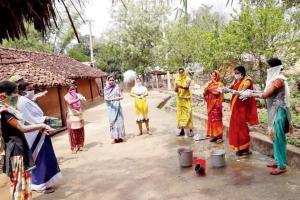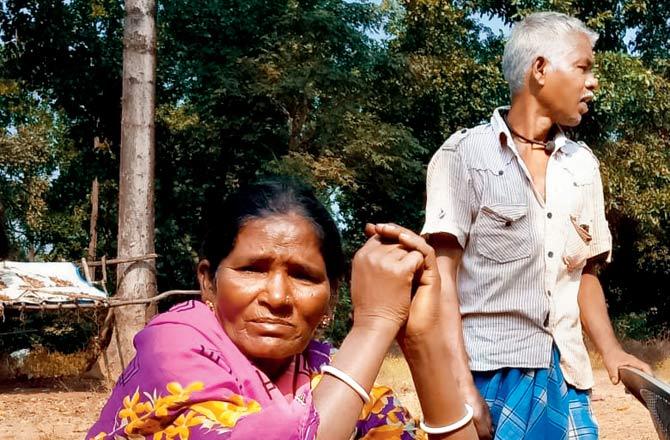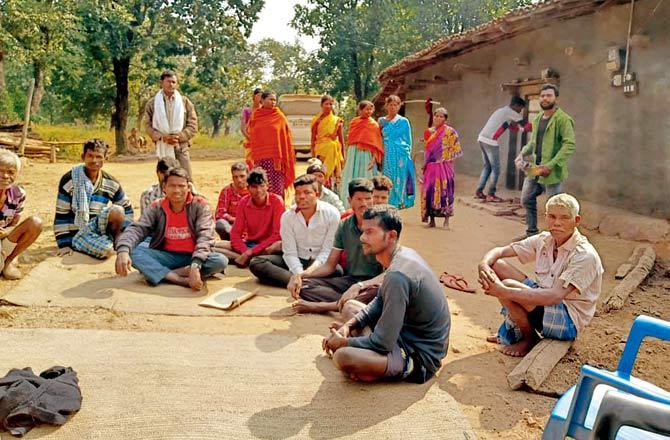Says report by civil society organisations, independent researchers on how lockdown has affected forest dwellers; to be presented to Centre, states this week

Social workers train tribal workers on washing hands in Jharkhand
Civil society organisations and independent researchers from all over the country have prepared a report explaining how the lockdown is adversely affecting tribal communities and forest dwellers amid an acute lack of awareness. It will be presented before the central and various state governments this week."
The assessment is prepared by civil society organisations and independent researchers who are working with tribals and forest dwellers. These include Campaign for Survival and Dignity (Chandigarh), Soumitra Ghosh of the All India Forum for Forest Movement (AIFFM), Neema Pathak Broome of Kalpavriksh, Pune, Tushar Dash and Sushmita (independent researchers), among several others. Work on the report has been in the pipeline ever since the enforcement of the lockdown measures on March 24.
 Representative image: tribal villagers in Jharkhand, Picture: Sushmita
Representative image: tribal villagers in Jharkhand, Picture: Sushmita
Remote location a challenge
According to the report, lack of information among the tribals and forest dwellers about the pandemic and about the required protective measures is a major issue in tribal areas. "Tribal settlements are located remotely, thereby making it particularly difficult for information to reach there," reads the report. "The reverse migration from cities and urban areas also raises concern about spreading of the virus in tribal areas."
The report highlights how a lack of proper healthcare facilities and low testing numbers of tribal populations increases the risk of infection and how the lockdown has affected collection, use and sale of Minor Forest Produce (MFP) by tribals and forest dwellers. It also includes recommendations to the Centre on how to combat the issue and help the communities in need.
 Representative image: tribal villagers in Jharkhand, Picture: Sushmita
Representative image: tribal villagers in Jharkhand, Picture: Sushmita
Speaking with mid-day, independent researcher Sushmita said: "COVID-19 impacts people with compromised health conditions and low immunity. This increases risks of infection amid the tribal populations living in deprivation. Testing and monitoring of the disease is inadequate and is mostly limited to urban areas. Providing testing facilities in tribal areas is a major challenge."
According to independent researcher Tushar Das, "The lockdown has affected collection, use and sale of MFP by tribals and forest dwellers. An estimated 100 million forest dwellers depend on MFP for food, shelter, medicines and cash income. The MFP collection season from April to June provides major income support to tribals (almost 60 per cent of the annual collection takes place during this period) and, unfortunately, it coincides with the lockdown. The trading and value chain of Non-Timber Forest Produce (NTFPs) has been completely disrupted under the lockdown as traders are not willing to buy NTFPs in the current situation."
The report recommends
According to both, Sushmita and Tushar, the Central government is yet to come up with a comprehensive COVID-19 response programme for tribal communities. The report recommends the Ministry of Tribal Affairs (MoTA) set up a COVID-19 response cell and give specific guidelines to address the problems of tribals and forest dwellers. "The MoTA should also ensure that district and sub-district level officers are well informed about all relevant guidelines and orders related to COVID-19 regularly and ensure that these are complied with," Sushmita said.
"The Centre should coordinate with the state governments to provide immediate relief to the tribal communities by ensuring information and awareness, providing health care and testing facilities in the tribal areas, support for MFP collection and sale," Tushar added.
100
Approx. no. of forest dwellers, in millions, depending on Minor Forest Produce
Catch up on all the latest Mumbai news, crime news, current affairs, and a complete guide from food to things to do and events across Mumbai. Also download the new mid-day Android and iOS apps to get latest updates.
Mid-Day is now on Telegram. Click here to join our channel (@middayinfomedialtd) and stay updated with the latest news
 Subscribe today by clicking the link and stay updated with the latest news!" Click here!
Subscribe today by clicking the link and stay updated with the latest news!" Click here!









